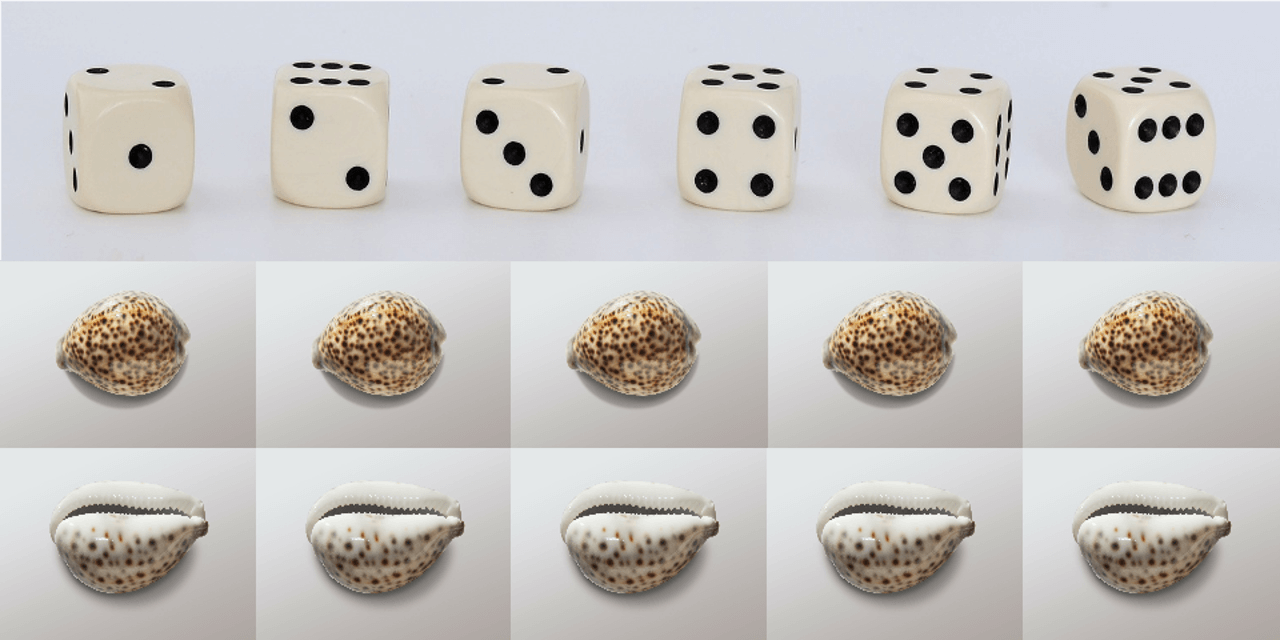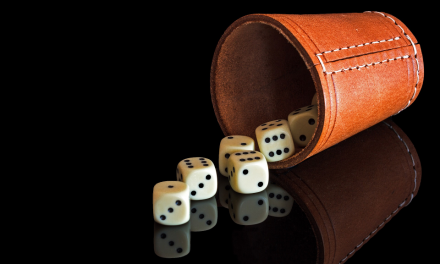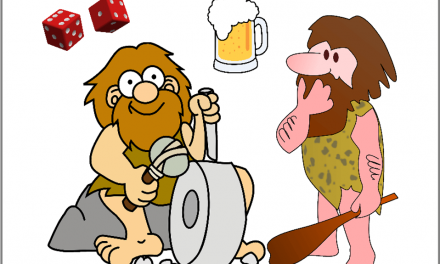In Part 5 of this series, we presented :
Your Invention Really Matters – How Inventors Have Infused New Life Into a Dying Industry
– – –
Let me see now …
Dice and cards and spinners and … And what?
What else can be used in a game to make a choice or present some random feature?
How are these things alike? And how are they different?
Well, here’s the short list:
And here’s their cousins :
-
Cowry Shells, Dried Beans, and (literally) Knucklebones
-
Dominoes, Mahjong, and other tile sets
-
Prize Wheels, Bingo Cages, and Roulette Wheels
And a few distant relatives and other kin :
-
Coin Toss
-
Rock, Scissors, Paper
-
Drawing An Item From A Hat (or, these days, from a bag or box) and, of course, there’s always …
-
The Proverbial Dart Board
OUR FIRST CLASS OF RANDOMIZERS ARE DICE
But not just dice. This class also includes simple lots.
And there’s a reason for that.
In some countries, dice are not available. Or at least, not available to the masses. So they make use of what they have. Sea shells, sticks and stones, shards of pottery, nuts and beans, and of course, animal bones. Or pieces of bone.
These things are alike in that they can be used like dice to determine whose turn it is and how far that person can move in a game. But most of them are different from dice in that they are binary. They present just 2 options. Right-Side-Up and Up-Side-Down.
And in these cases, with cowry shells for instance, 7 or even 10 shells might be tossed at a time. Then the number that land with an identifying feature uppermost (the “open” side is what is used when cowry shells are tossed) are counted and your stick or pebble is moved that far in a game.
Then, to make these games even more interesting, most of this type of game allows that if all the shells are facing either up or down, some bonus or some penalty may be imposed.
And there you have it. Improvisation at its best. Mankind’s inherent need to play games is not restrained by economics. Rich and poor alike, we all play games.
– return to index –
OUR SECOND CLASS OF RANDOMIZERS ARE CARDS
But not just cards. This class also includes tile sets. The kind used in Dominoes or in Mahjong.
You might ask, Why do these tile sets exist in the first place? Why not just use cards?
And in answer we could say, Well, because printing and paper production did not always exist. And when they did, these things were very expensive. More than a person of typical means could ever afford.
So people made their own playthings from materials they had on hand or could (at the time) acquire easily. And sometimes that meant carving pieces of ivory (as is done in scrimshaw) or whittling pieces of bone (as is done for knife handles) or pieces of wood (as is done for all sorts of things).
Ironically, these original methods and the original materials that were used are very expensive today.
But, at the time, they were not. And people were able to produce quality game pieces that lasted a lifetime.
– return to index –
OUR THIRD CLASS OF RANDOMIZERS ARE SPINNERS
This is a broad class that includes pretty much anything mechanical that can indicate a number.
And the reason for this is (at least) two-fold. Economics and Safety.
And when it comes to economics, we could say that this is not for reasons of saving money. But rather, in order to make money. Oftentimes, but not always, through the production, sale, and operation of gambling equipment.
And an example of this is the Roulette Wheel. 36 numbered pockets that indicate numbers and, you guessed it, that’s how many ways a pair of ordinary dice can land.
But its not always hot and heavy, outright gambling. Sometimes it looks and feels just like a game. That’s all.
Like a Prize Wheel at a carnival. Toss a beanbag through a hoop or into a basket and win a random prize. When you succeed, you spin the prize wheel to determine what that prize will be. That’s not exactly how the world’s carnies usually operate, but it could be.
And then you have the in between items such as Bingo Cages.
Which raises the question : Is bingo gambling?
And : Is it always? Or is it just a game?
And that is something we’ll probably never get a definitive answer to. So much has been said and so much has been written on both sides of the issue that in some places Bingo is banned. And in other places it is taxed. And in still other places it is neither banned nor taxed but actively promoted.
But all these cases have this in common : Whether it is played in school as a learning method or whether it is played in a Bingo parlor, Bingo is solidly based in drawing random numbers from a finite or “closed” set of choices. You can’t draw the same number twice. Not in the same game.
And this is how the apparatus used in Bingo is very much like a deck of cards (where you can similarly not draw the same exact card twice without replacement) and very unlike a pair of dice (that have no limit of times the same number can come up – at least in theory). 🙂
And when it comes to safety, well, let’s just say that little ones can’t always be trusted with dice.
In cases like that, with young children of anywhere up to 8 years old (I think that’s what I read somewhere, that some governments regulate small game pieces up to an “intended for” age of 8), if your child can’t be trusted with dice, spinners can be a godsend.
– return to list –
AND JUST A FEW RANDOM THOUGHTS …
Tossing A Coin is exactly the same as tossing a cowry shell. (Which, by the way, is a type of seashell.) But, you’re not likely to have a handful of seashells on you when you’re about to start a football game. 🙂
Rock, Scissors, Paper can be played with dice but it is primarily a “no equipment needed” game. And, for all you geeks out there, there is now a psychological study of the game done in the People’s Republic of China (PRC) by Zhijian Wang, Bin Xu, and Hai-Jun Zhou at Zhejiang University (ZJU) which suggests that playing “paper” gives you a tiny edge – a very, very small advantage – most of the time.
Drawing An Item From A Hat (or from a bag or box) is exactly what is done when you cut cards from a deck or when you draw a Bingo ball from its cage. And that makes, “You can’t put the toothpaste back in the tube”, very apropos. When it’s out, it’s out and when it’s gone, it’s gone – you can’t “put anything back” or “draw it twice” in any of these cases.
Which leads us to … The Proverbial Dart Board.
And we’ll leave a use for that little item completely up to you. Not that you’d ever have use for one. 🙂
– – –
Bonus Post : On Being Six and Knowing How to Choose

“Kids’ll say the darnedest things.”
Art Linkletter sure was right on that one. And he made a bundle with a TV show that proved his point. Young tikes telling us the meaning of life and the solution to all its problems.
And every word a treasure.
Do you remember the show? Or how about you? How was your speech back in days of yore?
What words did you use and how did you explain things? And just what did you believe?
Was life fair or did things happen by chance? Did everyone get the same amount to eat? The same size piece of cake and the same number of pieces of candy?
If you have ever been a child or had one of your own (and if you or they were unusually literate), you might have said or heard it said that Justice sometimes looked the other way. Her being blind is one thing, but her being unfair is quite another. Why can’t she have looked out for all of us just a little better.
Or, more probably, you said, “Eeny, Meeny, Miny, Moe” or “My Mother and Your Mother were Hanging Up Clothes … .” Or something else that made the deciding perfectly fair and honest and just and true all the time.
Problem solved. Life was sweet.
So what does any of this have to do with dice?
Just this: randomization is important to us from the time we are a child all the way up through our adult years. We never forget the sweets we missed out on or the bench we sat on because we were picked last for a game. Or, later in life, the raise we didn’t get or the girl or guy we didn’t marry.
When life isn’t fair (not random enough or not random at all), or when things seem to happen for no reason at all (just plain too random), then we balk and squawk.
Even when we know we shouldn’t. When we knows its just a game and that being the better man or better woman, or being sporting about it, or being as good a loser as we are a winner, really is what life is all about.
The kids were right. Sometimes you get the smallest piece of cake, not because god or your fairy godmother ordains it to be so, and not because someone has it in for you, but quite simply, “Cause that’s all there’s left.”
– – –
In Part 7 of this series we will present :
“Like a Man Obsessed” – Dice Collectors Tell Their Story
We might just include some interviews in this post. 🙂




